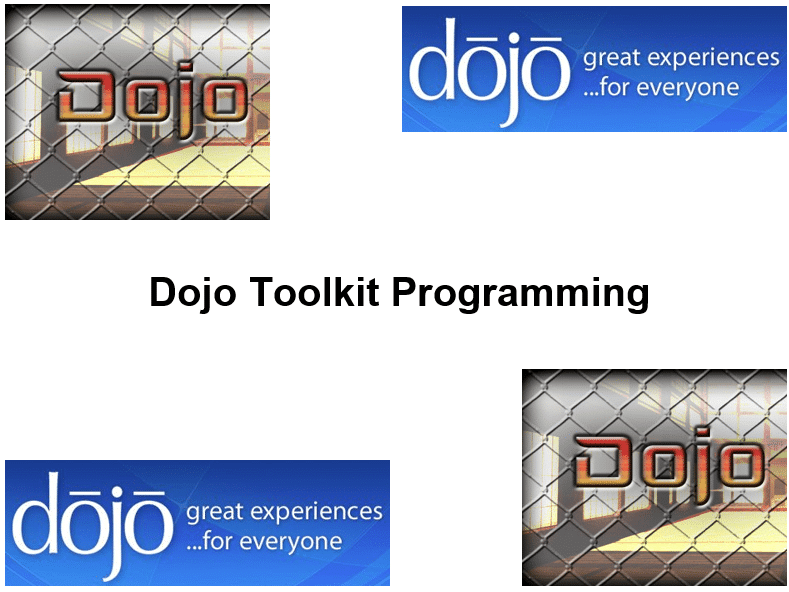-
Learning by doing
-
Trainers with practical experience
-
Classroom training
-
Detailed course material
-
Clear content description
-
Tailormade content possible
-
Training that proceeds
-
Small groups
The course Dojo Toolkit Programming provides an overview of the operation and possibilities of the Dojo Toolkit and deals with how dynamic web applications can be created with Dojo.
In the first place attention is paid to the Dojo Architecture and the Dojo Toolkit libraries, with a prominent place being taken by Dojo's Module System. The participants learn how modules work and how they can be loaded asynchronously via AMD, Asynchronous Module Definition.
Next interaction with the page via DOM and Dynamic HTML is discussed. This includes event handling.
Dojo GUI interfaces with the Dijit widgets are also on the course program. The different types of widgets such as command and text controls and containers are treated.
Object-oriented programming with Classes and Objects in Dojo is discussed and attention is paid to how Ajax functionality can be implemented in Dojo applications.
In line with this URL mapping in Dojo, defining routes as well as back button handling and bookmarking are treated.
Next the Dojo and Rest module discusses how a Dojo Application can access a Rest Service and how the Dojo store is used for storing and querying data.
Finally attention is paid to the use of Dojo Mobile for applications for mobile devices.
The course Dojo Toolkit Programming is intended for Web Developers who want to learn how to use the Dojo Toolkit to develop dynamic web applications.
To participate in this course knowledge and experience with JavaScript, HTML, CSS and Web applications is required.
The theory is discussed on the basis of presentation slides. The concepts are illustrated with demos and the theory is interspersed with exercises. The course times are from 9.30 to 16.30.
Participants receive an official Dojo Toolkit Programming certificate after successful completion of the course.

Module 1 : Dojo Intro |
Module 2 : Dojo DOM Access |
Module 3 : Dijit and Forms |
|
What is Dojo? Benefits of Dojo Features of Dojo JS Foundation Dojo Usage Dojo Architecture Dojo Base and Core Asynchronous Module Definition Defining Modules Loading Modules Configuring Dojo Modules Loading Modules Locating Packages Dojo Build System |
DOM Manipulation DOM Retrieval DOM Creation DOM Placement DOM Destroy Dojo Query Restricting Queries Advanced Selections NodeList Foreach Connecting to Events Dojo Event Handling On Method Event Delegation Publish and Subscribe |
What is Dijit? Dijit Registry Dijit Attributes Dijit Events Dijit Widget Types Menu Widgets Layout Widgets Tree Widgets CheckBoxes and RadioButtons on Change Events NumberTextBox DateTextBox ValidationTextBox Form Validation |
Module 4 : Classes and Objects |
Module 5 : Ajax Interaction |
Module 6 : Routing |
|
Classes and Objects Encapsulation Prototype Based OOP Adding to Prototype Dojo Object Orientation Named Classes Anonymous Classes Using Mixins Object Sharing Using Statics Single and Multiple Inheritance Call Superclass Methods Constructor Chaining |
Ajax Term Explained Classic Web Application Model Ajax Web Application Model Classic Synchronous Interaction Ajax Asynchronous Interaction XMLHttpRequest Object Methods Sending the Request Listening for Response Ajax in Dojo Dojo Request Request GET and POST JSON Request JSON with Padding |
URL Modification Bookmarkable Pages dojo/hash module Back Button Handling Single Page App Topic Responses Dojo Router Route Parts Router Properties Router Callback Register Function Router Responses Router Configuration |
Module 7 : Dojo and REST |
Module 8 : Dojo Stores |
Module 9 : Dojo Mobile |
| What is REST? RESTFull Web Services ID and Links Multiple Representations Stateless Communications Content Negotation Simple Root Resource Container Item Pattern Map, Key, Value Pattern Dojo Clients DojoX and Comet |
Creating Stores dojo/stores Memory Store query Method Query Engine QueryResults Stateful Modeling Object Data Binding DataGrid Cells and Rows Views |
dojox/mobile Dojo Bootstrap Configuration Dojo Mobile Template Views and Widgets Base Widgets FeedView Settings View Build Profile Minimize Dependencies Layers and Features Building with Node.js |
